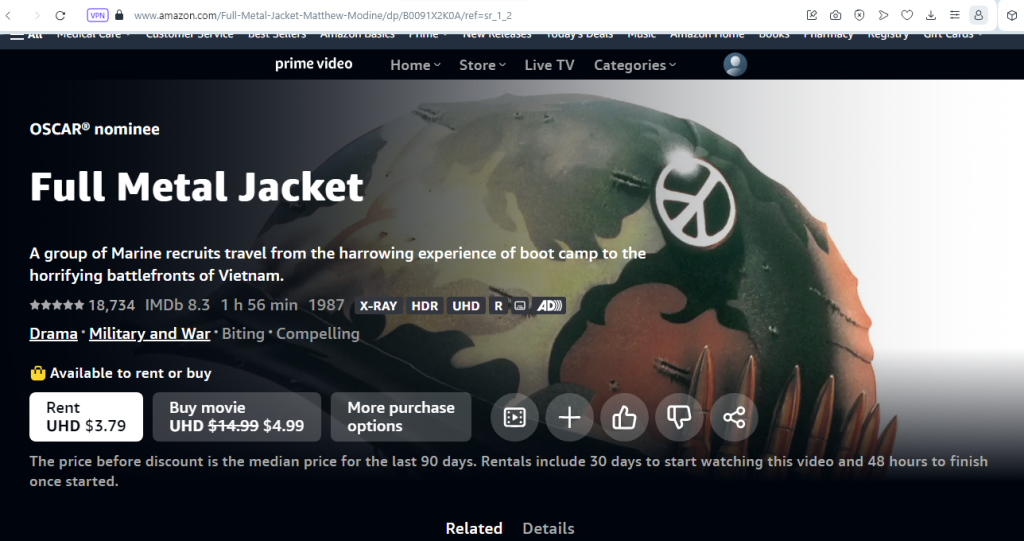Recently Amazon removed the “Born to Kill,” from Jokers helmet for the film Full Metal Jacket. The words sit alongside the peace emblem on his steel helmet and makes for an iconic film poster. So it once did. The words perhaps too violent for modern audiences according to the corporate minds of Amazon or maybe it was just a stylistic choice. But also everything is meant to be child friendly now. The duality of man no longer stands to mean a thing, Stanley Kubrick’s visual representation of war and the brutality that it unleashes may some day soon receive it’s own editing.
Oliver Stone achieved a similar example of the complex nature of man in war with Elias, Barnes and Chris in his film Platoon. In Barnes we have the ruthless killer, perhaps the perfect warrior who is indifferent to the aims of the war other than in the killing of the enemy, civilians included. Elias is the paternal guide who instructs the youth, Chris how to live and survive. He wages the war with dignity and is the light of morality despite the wars darkness. Chris is the insert for the rest of us, the virgin taken into the jungles to be blooded and not die. As Chris remarks in the closing monologue, both men are fighting over the possession of his soul. It is a duality that marks the essence of the film itself.
Nuance is lost now, the subtext and layers that characters and moments may reveal seems to be expressed in Ahego face or like in Anime with thoughts screamed out so that the audience may be aware of what emotions are to be shed. Characters are cosplaying actors, defined by gender and costumes rather than any unique essence or dare I repeat the word, character. Underlying meaning and attention to detail slowly evaporated with slight edits and re-imagines. Joker can be both a killer, comedian and express a morality absent among his peers in Full Metal Jacket.
The violent sexuality of the soldiers as they penetrate the female Viet Cong sniper with their bullets likely too obscene to be seen by a culture that remains indifferent to real war. The re-enactment of the My Lai massacre in Platoon seemingly a fiction and not a representation of reality. Men of war can be complicated, comrades, smiling, gentle, kind, familiar and yet capable of such violence. The nature of war mutates morality into a series of objectives, above all survival. We are allowed to see the dramatisation of this in cinema, feel repulsed by it even aroused.
Cinema can be both pornographic and absurd, it’s extremes are meant to do more than just entertain or stand as art. The invoking of our thoughts and emotions is crucial to the very essence of character and story. Except both are becoming rare. The audience for the most part seems to have lost the will to explore outside of what lingers on a streaming service or the popcorn presentations that run through their minds like an amusement park ride they occasionally visit. The films that once did have substance now run the risk of becoming adapted for modern audiences, meaning edited so that child brains are capable of ‘enjoying’ them. But we don’t have a choice in the matter, outside of owning physical media. We are all condemned to be child like in our ability to discern what we can and can not watch. As always Helen Lovejoy screaming in the background, “Won’t somebody think of the children?”
Not everything is made for everyone, that is what makes cinema or art in general beautiful. We are taken into a world that is at times unrelatable but a depiction of what many have been forced to experience. We can sit as voyeurs or attach ourselves to a character, sharing in their moments. We need not agree with what they do. We see how situations may steer decisions and actions or even inaction. The random reckless violence of war taking a character we may be fond of or barely sparing our hero. Though they may survive, they never leave the war entirely.
War is repulsive in film, even when it’s complicated and made to seem glorious. We see the misery and fear, propaganda struggles to omit it from our senses. Then when we do have a film made as a statement, created to remind us of what war does to men and civilians, it no longer is sacred. Instead it can become another property to be hacked to pieces. Cynically this is not even done to preserve the status quo or even to promote the next war. It’s done because the audience themselves seems to have abandoned cinema, art and intellect. The corporate types respond accordingly and so here we are. In an age of immature spectators and those who are hungry, who do yearn for the truth in art and the credibility of nuance must look elsewhere.
Censors will do their thing for a litany of reasons, the coming years will see it for the most pathetic. They do it for you, to protect you from the complexity of the world. To be packaged in a safe and secure manner so that it does not offend. Art is meant to offend. Censorship and “dumbing” down cinema or art itself so that children or the easily triggered may enjoy it is in itself offensive. The wars will go on, the anti-war films however shall as always struggle to keep up.
June, 2024






